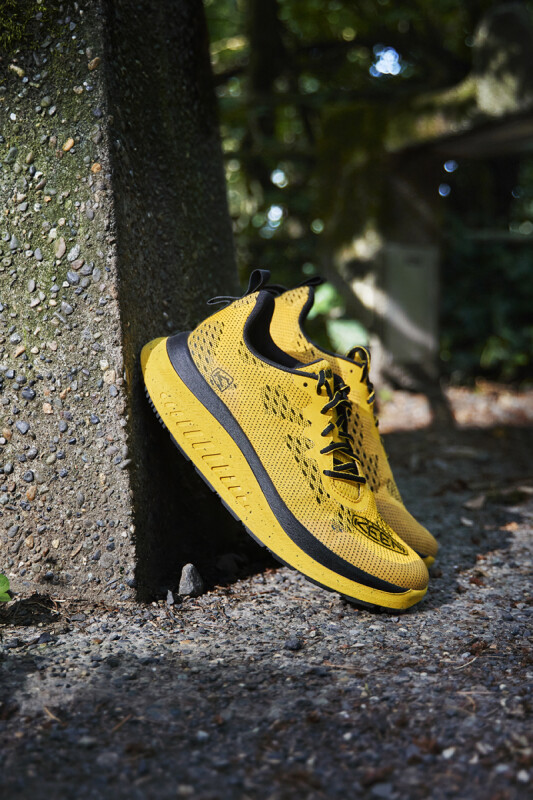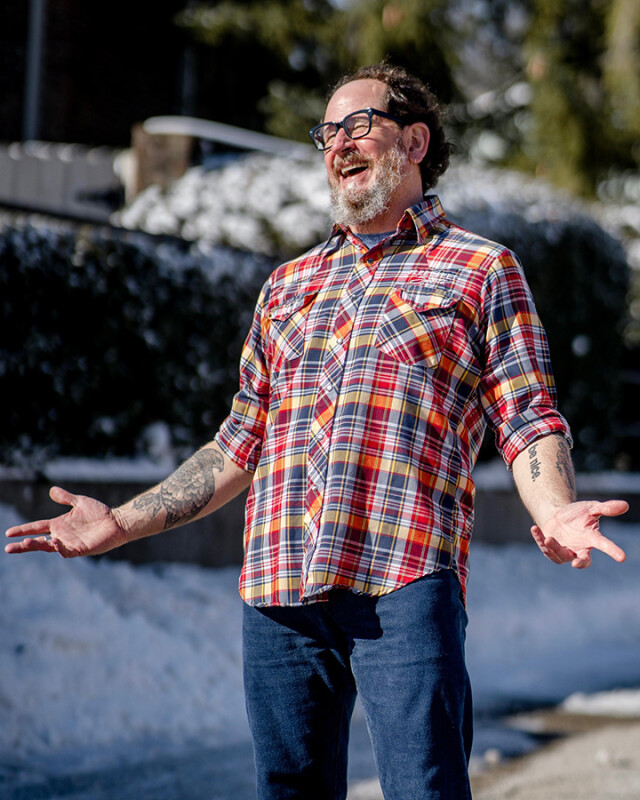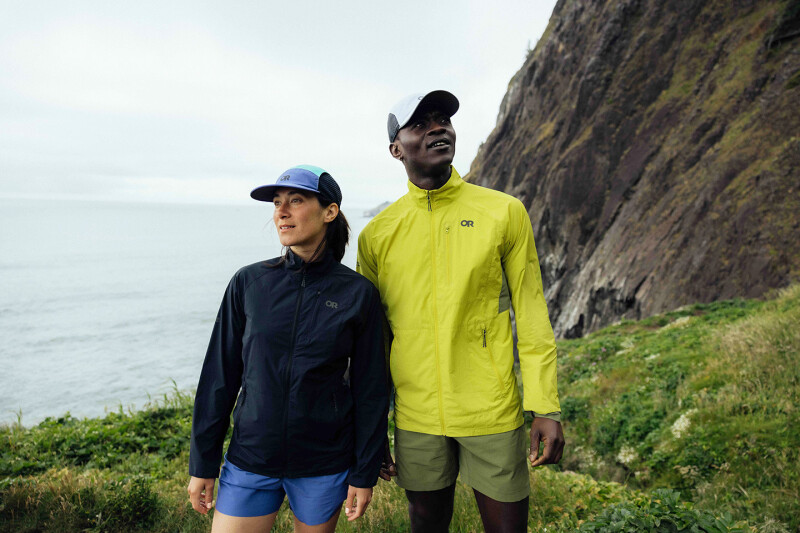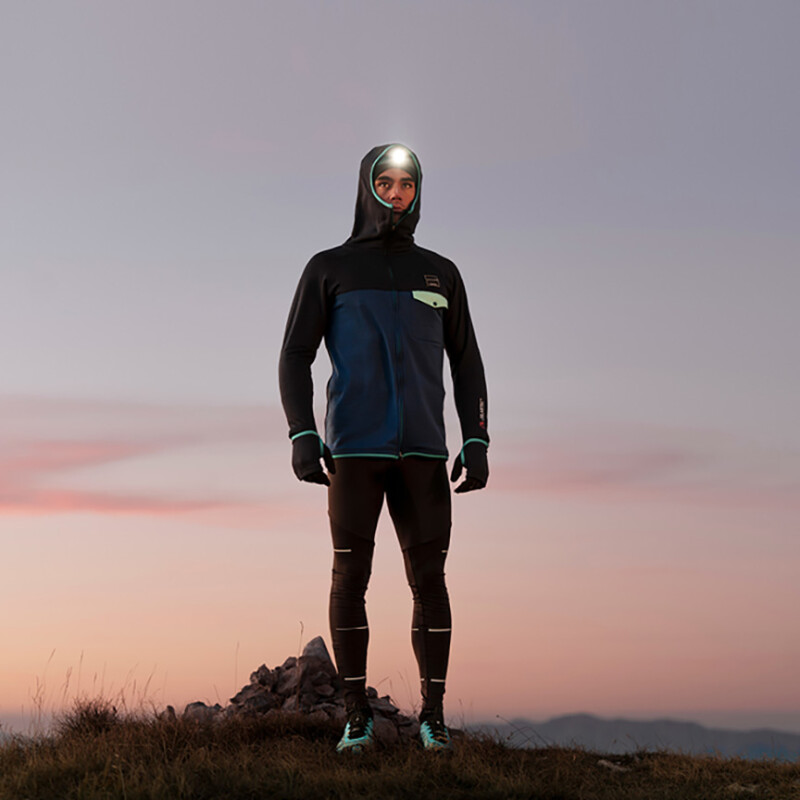These days it’s nearly impossible to come across an apparel brand that doesn’t incorporate sustainability into some aspect of its mission. The number of running and activewear brands putting eco-initiatives at the forefront of their product lines is increasing everywhere you look, which means runners can feel more confident than ever that their favorite brands are prioritizing the planet.
For some brands though, the challenge isn’t simply incorporating eco-practices that meet the industry standard; instead, it’s all about taking it up a notch and striving to outperform their previous efforts. Whether that involves reducing more waste (almost all of it to be exact) or appointing new key hires to focus on entirely on sustainability, the number of key running and outdoor brands pushing the limit to make a better environmental impact on the industry this year is impressive.
Keen on the Environment
Keen, an outdoor footwear brand, was founded in 2003 on the foundation of bringing people together and taking care of the planet — while making durable shoes at the same time. Twenty years later, the brand continues to emphasize the importance of these core values and find new ways to ensure its products are reducing their carbon footprint.
“Hundreds of decisions go into designing and manufacturing a pair of Keen shoes and we believe each one is an opportunity to lighten our impact. This year’s strategy is to build on our 20-year heritage of sustainability by recommitting to our fifth brand marker: Create with Conscious,” says Kirsten Blackburn, director of Keen Effect.
To Keen, creating consciously comes to life in four ways: harvesting (or upcycling and recycling materials to reduce the need for virgin materials), sourcing ethically, detoxing its supply chain and making long-lasting, durable products.
“Being conscious of what goes into our shoes and how we make them is not new to Keen. We harvest or upcycle and recycle materials like car seat leather scraps and recycled PET bottles whenever possible,” points out Blackburn. “We source our materials ethically, like only buying leather from environmentally preferred Leather Working Group Certified tanneries.
“We are committed to putting the people first that build our shoes and holding our manufacturing partners accountable against a robust code of conduct,” she adds. “We make durable shoes designed for more than one life because we understand that durability is sustainability. And since 2014, we’ve been committed to detoxing our supply chain of six of the most harmful chemicals found in consumer products.”
While integrating better materials to ensure durability is not new for the brand, Keen does have some projects in the works for taking its eco-impact up a notch.
“What’s new is our commitment to building off of our 20-year heritage to do things differently. As a family-run business, we both have permission and feel a responsibility to share our learnings with others,” Blackburn points out, adding that through radical transparency and open-sourced innovation, the brand wants to help change the way shoes are made to benefit people and the planet.
For example, in 2018, after four years and 10,000 hours of research, Keen removed PFAS, or “forever chemicals,” from its shoes and packaging in 2022. It also penned a Green Paper in 2021, providing a roadmap for others to detox from PFAS using less time and resources.
The implications PFAS can have not only on the planet’s health but also on people’s health is pretty significant. That’s why Keen is going to dedicate more resources towards helping others remove PFAS from their supply chains.
Keen, like many other outdoor brands focused on sustainability, ensures that it is creating meaningful relationships with the runners and athletes it serves, especially as the environment becomes top of mind for consumers.
The largest segment of fans at run specialty is what Keen likes to call the Outside Athlete — the folks will most likely be outside pursuing fitness through activities such as trail running, fast hiking and mountain biking. And while all of its fans are engaged in sustainable behaviors, the Outside Athlete segment is the most engaged. In fact, Keen’s research found that 63 percent of Outside Athletes believe the environment is at a critical stage and change their behaviors accordingly.
“Further, we know fans expect this from us,” says Blackburn. “In our ongoing brand health tracker, Keen outperforms other outdoor brands on the ‘socially conscious’ attribute, consistently over-indexing on this score. Outside Athletes shop run specialty and outdoor retail for their specialized footwear needs, and we believe they show up with sustainability in mind.”
However, part of that connection with customers also comes from retailers. Creating meaningful relationships with retailers and training them to be well-versed about the brand’s initiatives helps further that relationship with customers.
“We recognize that the best way to get the word out about anything – whether it be a new shoe or our PFAS-free movement – is through the staff on the floor,” says Blackburn, so in 2023 Keen’s Field Service team is mobilizing to host events and clinics with retail staff across the country.
“Our commitment to Consciously Creating our shoes is at the foundation of this outreach and educational curriculum,” she continues. “Our team of footwear experts is ready to answer your tough questions, whether you want to know the manufacturing process for your boot’s waste water or how all footwear construction is not equal. If any of our retail partners want to learn about sustainable products, we’re happy to stop by any time.”
Keen values its retail partnership and has several ways to keep them engaged and help them get involved.
“Working directly with our retail partners is key to catalyzing change. We offer a variety of ways for our retailers to both help educate our fans about important issues like PFAS and inspire the industry to reduce our collective impact,” Blackburn explains. Some examples include Keen Field Guide visits to provide clinics and host local volunteer events, in-store POP and digital assets educating fans on product and related sustainability stories, and opportunities for collaboration and feedback.
Kahtoola Climbs
New Eco-Heights
Kahtoola, the maker of footwear traction products for running and outdoor activities, was built on the foundation of lowering its environmental impact while helping others lower theirs. Recently, the brand launched a Forest Green version of its MICROspikes footwear traction and has promised to donate two percent of sales to the 1% for the Planet Impact Fund at National Philanthropic Trust, which allocates gifts to resources and environmental organizations addressing today’s urgent environmental issues and make power investments that build a healthy, sustainable world.
“Our goal is to create products that make outdoor adventures more accessible and rewarding and underlying that is the responsibility we have as a company to address the climate crisis to the best of our ability by minimizing our environmental impact,” explains owner and founder Danny Giovale.
The MICROspikes are designed for hiking and running in snow, ice and muddy conditions and feature 12 stainless steel spikes per foot that bite into ice and snow, providing a stable platform. In addition, they have an ergonomically shaped harness that features a raised heel tab to pull over shoes and boots while retaining its elasticity down to -22°F. These spikes are designed to be lightweight and packable and allow users to safely navigate mountainous terrain.
Like all Kahtoola products, these new MICROspikes are both durable and repairable to align with the company’s promise to reduce waste and energy consumption, while increasing the company’s longtime existing commitment as a 1% for the Planet member.
“This product-specific initiative is one important way we can increase our efforts by doubling our usual 1% for the Planet commitment to support the efforts of this proven environmental organization,” says Giovale.
Sprinting Towards
100 Percent Waste-Free
Reducing 100 percent of waste for a running apparel company seems like a pretty ambitious feat, but not for Sprints. The brand challenged itself to eliminate the entirety of its waste during its manufacturing process and, so far, it has been pretty successful.
“Fashion development creates waste. Excess fabric, defective products and returns all contribute to this waste. We challenged ourselves to see if we could reduce 100 percent of the waste in our manufacturing process,” explains design manager Madi Dibattista.
Although it has not yet reached its 100 percent waste reduction goal, it is coming pretty close with an estimated 83 percent of total waste eliminated. Sprints achieved this by leaning on its design team to find creative ways to repurpose excess fabric, defective products and returns. The solution? A new product made from these excess materials called the Hat Bag designed to carry apparel and shoes, workout kits and other equipment.
“We read a report that just 12 percent of the material used for clothing ends up being recycled. We wanted to learn why and it turns out that because clothes are complex combinations of fibers, pieces and accessories the technology to identify and sort fabric types is limited,” says CEO Eric Rose. “We believe the technology outage makes it important for individual companies to create unique processes for enabling sustainability,”
The Hat Bags are made by disassembling hats and reconstructing mismatched quilts of colorful fabrics. The hat’s inner recycled plastic brim, original thread and interfacing elements are the only pieces that Sprints’ team was not able to repurpose.
“We learned something new at every of step of this process. Shockingly, getting the hats taken apart was the most time consuming and difficult step,” says Dibattista.
Part of the inspiration for moving towards a more sustainable manufacturing process comes from the community and customer concerns for choosing eco-conscious brands. Sprints evaluated these concerns from its customer base and developed this program to create a forum to collect feedback and ideas from the runners it serves.
“Our project won’t solve the macro industry issue, but it could provide a spark for collaboration from other brands. We see this as our whitepaper with a call for others to give feedback and help us think through what it would take to get to 100 percent,” says Rose. “The early response has been incredible and the team is working to establish two yearly limited edition drops for the bags. We are also continually iterating with our manufacturing process to minimize the creation of excess fabric in the first place.”
Retailers can join in on collecting Sprints hats from their shoppers when they are ready for upcycling and reach out via email to [email protected] to receive free shipping labels to return collected items.
Getting Darn Tough on Sustainability
Darn Tough Vermont’s commitment to sustainability took a huge step recently with the creation of a permanent position within its team that is entirely dedicated to fostering eco-initiatives. Filling the new role is Kristen Graf, who joins the company as its new global director, environmental and social responsibility, bringing two decades of experience in developing and overseeing sustainability and equity programs.
“Having Kristen in this new role ensures that we continue to do and be the best that we possibly can be in regards to both environmental and social responsibility,” says Ric Cabot, president and CEO. “Her passion and background in social responsibility will play a big part in who we are as a brand moving forward.”
Previously, Graf was the executive director for Women of Renewable Industries and Sustainable Energy (WRISE). At Darn Tough, her responsibilities will “focus on the brand’s mission to produce quality socks while positively affecting the environment and the community.” Stepping into her new role, Graf’s priorities will be in a few key areas where Darn Tough has already been working to expand its capacity. The first and likely most expected effort is around the brand’s evolving environmental sustainability journey.
“Manufacturing a durable product backed by a lifetime guarantee means many steps toward sustainability are already tied into the process here and have been since the beginning, but durability is only one layer and the team has been working hard to improve in a variety of other ways over the years,” Graf tells Running Insight. “My role brings all of those efforts across the company – from raw materials selection and product innovation to energy use, waste transparency and consumer education – together to ensure we are all working in alignment and staying focused on our most critical opportunities.”
Another key area of Graf’s role will be focused on reinforcing Darn Tough’s commitment to being an equitable and fair workplace for its entire workforce. This includes a strong focus on continuing to improve what the brand calls JEDI (Justice, Equity, Diversity and Inclusion) by programming internally and externally in line with its commitment to valuing diversity.
“My role has a focus on Darn Tough’s commitment to our broader community as well – the community where our socks are made as well as the communities where our socks are used and loved,” says Graf. “We have had a longstanding relationship with the Vermont Foodbank and we want to continue to grow our capacity to support the organizations doing important work that helps all of these communities thrive.”
Graf certainly has a lot of community and eco-initiatives to keep her busy in her new role, but she is excited to learn from those around her, especially the retailers the company works closely with.
“I have been so impressed to witness how hard the Darn Tough team works to build strong relationships, ensure great experiences and get regular feedback from everyone we work with, including retailers,” she says. “We love to know what retailers are hearing from their customers and what retailers are focused on in their own sustainability and diversity efforts as well and how we can be helpful.”
Making a Swift Impact
With a goal this year to include recycled, renewable and/or responsible fibers in all of its products, Swiftwick recently unveiled its Maxus socks with a Repreve performance recycled polyester footbed. The Maxus footbed offers the same moisture-wicking properties as Swiftwick’s original Maxus, with each pair using one post-consumer water bottle.
“Sustainability across both our business practices and our finished goods is important to our company and top of mind for our customers, which is why we’re excited to share the new Maxus made with Repreve,” says CMO Joanna Mariani.
Swiftwick is also committed to sourcing 80 percent of its Merino raw materials from Responsible Wool Standard-certified sources by the end of 2024 and looks to work towards 100 percent by 2027. The organization aims to improve the welfare of sheep and the land they graze by independently certifying animal welfare and land management practices in wool production and tracking certified material from farms to final products. In 2019, Swiftwick removed single-use plastic from its consumer packaging and is working to increase the total percentage of sustainable fibers in its goods.
“We continuously work to reduce our environmental impact across our manufacturing processe, and this new release helps to close the gap in our sustainable product offerings,” explains Mariani.
Houdini’s Magic Act
Curating a sustainable line is about more than just integrating eco-friendly materials into products for this activewear brand. Rather, outdoor apparel maker Houdini is working towards creating an entirely circular collection to promote less wasteful consumption and more impactful purchases for runners.
“Since its founding, Houdini has operated with sustainability as its central pillar. It’s always been the brand’s DNA, but we know we must do more for the planet which is why we are moving towards a completely circular collection,” explains says Niclas Bornling, GM of North America and head of global brand. “Our philosophy is we don’t need more clothes, we need clothes that do more, and this starts with our design checklist.”
On that checklist are the following three questions: Does this product deserve existence? Will it last long enough? And is it versatile enough?
According to Bornling, these questions help shape manufacturing and design choices and the materials Houdini uses — the brand has been PFA-free since 2018.
“Our current product line is 100 percent sustainable and 87.4 percent circular with the goal of being 100 percent circular soon. The central focus in our design is to create garments that blend versatility, durability and longevity with sustainable materials as the most important action we consumers can do to lessen our environmental impact is to buy less,” says Bornling. “Our role as a brand is to create garments that empower that behavior.”
Billions of garments are produced each year and a significant number of them end up in landfills due to poor quality, quick revolving trends and excess product. Houdini aims to create durable products to minimize its impact on landfills globally.
“We want garments to be versatile and durable. The Houdini Menu Project is an excellent example of our commitment to this philosophy. In addition, last year we ran the Live Large With Less clothing challenge; an initiative that challenged participants to focus on the impacts of their buying choices on the environment and use a reduced wardrobe for the summer. This effort culminated in our CEO, Eva Karlsson’s 7 Garments, 7 Days Challenge at New York Climate Week last September,” says Bornling.
As for run retailers, carrying sustainable brands can be good for business for a variety of reasons, but one that remains top of mind is customer demand and the increasing desire to shop eco-friendly brands.
“Our love of nature and being outdoors connects our industry,” says Bornling, adding that for many of us it’s what brought us to the business in the first place. “We need to do whatever we can to support our planet.
“The good thing is that running and outdoors brands are designing and producing more sustainable options for users of all skill levels, enabling consumers to make more planet-friendly purchasing decisions.”
Creating a strong relationship with retailers can help make it easier to get the word out to customers that their favorite brands are focusing on the planet.
“Some retailers have already started, as the outdoor industry has slowly moved away from PFAS and more brands have instituted secondhand programs, but there’s always room for more,” Bornling says. “Retailers can have sustainable messaging in stores or on their websites that educates consumers.”
The key is making sure this messaging is obvious and easy to find, not buried in the store or on a website. It should be front and center to all aspects of the consumer experience.
There’s also a need for open collaboration between brands, retailers and suppliers to achieve meaningful change. Houdini believes in this collaborative growth and supports it with an open source philosophy that was highlighted in its Mono Air launch, whose goal was to create the most sustainable fleece out there, and then share those developments with industry.
Ensuring retailers are part of the process is important to Houdini and the brand has implemented a repair program to keep retailers involved with its ongoing initiatives.
Its U.S. repair program invites its retailers to engage with Houdini for an ‘End of Life’ take-back program to recycle Houdini garments and fabrics. The brand also runs clinics with store staff to help them understand the concept and nuances of circularity and avoid greenwashing.
UYN Pushes Eco Limits
UYN, a Trerè Innovation company, is a sustainable Italian apparel and footwear brand that keeps Mother Earth top of mind for everything it does. Founded in 1950, UYN’s parent company, Trerè Innovation, has put sustainability at the forefront of its mission since inception and these same principles were incorporated in UYN when it was launched in 2018. Now, in 2023 UYN is continuing to push industry limits in sustainability by integrating the most eco-friendly practices into its manufacturing process.
“Whether this is footwear, apparel or socks, every single product UYN uses next-generation technology enabling us to provide consumers with the most planet-friendly options, to manufacture our products in a way that minimizes our impact on the earth to create retail environments where every single detail, including the signage and the furniture is made from recycled cardboard,” explains CMO Mattia Bazzoni.
UYN’s manufacturing process has key sustainability attributes that are broken down into three categories: air, water and land. Headquartered in Asola, Italy, 100 percent of the energy consumed comes from renewable sources, keeping CO2 emissions to a minimum, saving 410 tons every year. UYN’s water filtration system results in 100 million fewer microplastics being put in the ocean every year and 100 percent of the textile waste resulting from manufacturing is recycled. One part in particular is regenerated to produce Airnest, an insulation material used to pad UYN’s winter jackets.
“Our products use a robust selection of natural components, including castor oil seeds, Merino wool, yak wool, paper cotton and eucalyptus plants,” says Bazzoni. In addition, its retail stores have adapted 100 percent recyclable cardboard displays. Compared to conventional wooden displays, this solution has enabled the company to save 80 percent on energy and reduce tree cutting by 80 percent. Furthermore, no harmful chemicals are used in the manufacturing of its displays.
Because sustainability has been a fundamental principle for Trerè Innovation and now UYN since the very beginning, the creative design and engineering of UYN products comes from not only its staff, but also the research efforts that are done in the company’s research facility — the Academy for Research and Engineering in Apparel and Sports (AREAS). AREAS combines science, performance and biotechnology in order to ensure that each UYN product is crafted to be of the highest sustainable quality.
“As of August 1, 2023, we will also be the first sportswear brand in the world to launch three lines of 100 percent bio-based technical underwear on the market,” says Bazzoni. The products are made from a revolutionary mix of natural and bio-based fibers such as kapok, the world’s lightest natural fiber, Biolight from beech wood and Flexicorn from corn seed, a sustainable substitute for elastane.
“UYN’s mission is to completely eliminate the use of synthetic fibers derived from fossil fuels, while still creating high-performance products,” Bazzoni explains. For example, Biotech underwear – 100 percent bio-based underwear – has been tested and used in competitions by Italian downhill skiing champion Sofia Goggia. Other athletes of the brand, from ultra-runners to cyclists, are already using it as well.
In addition, UYN decided to produce its base layers for the U.S. market in Pennsylvania, to reduce the movement of goods through intercontinental flights to be more sustainable with its transportation pledge as well. Part of this effort also comes from the brand’s attention to consumer concerns and figuring out ways to better source and transport products to help meet their expectations.
Part of cultivating business partnerships with retailers comes from UYN’s training to provide stores with the right messaging when educating their customers.
“Retailers must provide clear and easy-to-understand messaging in stores and on their website — the messaging should be succinct so that it may be easily understood,” Bazzoni says.
Although UYN has had its roots in Italy, the brand is now continuing to expand to the U.S. and looks to duplicate the retail experience it provides to customers in Europe.
“We are just entering the U.S. market, so this is a work in progress,” Bazzoni says. The brand intends to open several stores in the U.S., starting with Boston this month. Its goal is to duplicate the experiential retail environment it has in its stores in Europe where it is able to show how its products are made from start to finish beginning with kapok, castor oil seeds, merino wool, yak wool, paper cotton and eucalyptus plants. In addition, all of its store furniture is made from cardboard, so consumers can see the extent to which it takes its responsibility seriously.
“Our messaging is incredibly detailed in-store as well as on our packaging, thus the sustainability story is front and center,” Bazzoni adds. “For U.S. retailers, we will provide similar teaching tools so they can share our story with their consumers. It is very important to us that shop employees can communicate our story to consumers.”
rabbit Chasing Dreams
Combining social media outreach with an always-interesting product line, apparel brand rabbit recently unviled its Dream Chaser Series — monthly stories about individuals who dream on their own terms. As the company puts it: “In honor of our unique running practices and our collective aspirations, we hope you’ll be inspired by the stories we tell.”
In addition to the stories of dreams there is an sustainable apparel element to the effort. Among the products:
• Race Pace Tee and Tank: The solids are made from 100 percent recycled poly and the printed styles are made from 80 percent recycled poly and 20 percent poly. These new semi-relaxed tees and tanks perform with breathable ease. Laser-cut square perfs bring airflow when runners need it most, while the microtextured inside ensures an ultra-lightweight, moisture-wicking, cling-free finish.
• Fuel n’ Fly Shorts: The Fuel n’ Fly shorts are also sustainable. The woven is made from 91 percent recycled poly and nine percent spandex. It also includes a new fabric incorporated into the brief liner, made using Polartec Power Dry with Fresh Face technology. The moisture-wicking fabric features a peppermint-based anti-odor treatment while the bluesign certified peppermint oil is easily renewable, highly sustainable and biodegradable. The Fuel n’ Fly are a semi-relaxed fit with low-rise waist, infinity drawstring and laser-cut square perforations along the front sides. With five pockets, the half-split style means every race feels free and cool.






